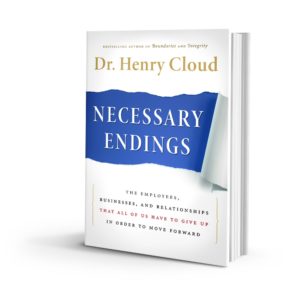By Rose O. Sherman, EdD, RN, FAAN
 A colleague of mine recently left a position and an organization that she had been in for years to pursue a new venture. She had been contemplating a move for several years but just recently made the decision to leave. In his wonderful book Necessary Endings , Dr. Henry Cloud a leadership expert discusses the challenges that we face when we look at ending things. For most of us, pulling the trigger is difficult yet crucial. He writes that “Without the ability to end things, people stay stuck, never becoming who they are meant to be, never accomplishing all that their talents and abilities should afford them.” Growth demands that we have the ability to move on whether it be to a different job, different activities or maybe a different relationship. There are necessary endings. Peter Drucker, widely considered the father of modern management, once noted that most of us are much better at starting things than ending something that is no longer working.
A colleague of mine recently left a position and an organization that she had been in for years to pursue a new venture. She had been contemplating a move for several years but just recently made the decision to leave. In his wonderful book Necessary Endings , Dr. Henry Cloud a leadership expert discusses the challenges that we face when we look at ending things. For most of us, pulling the trigger is difficult yet crucial. He writes that “Without the ability to end things, people stay stuck, never becoming who they are meant to be, never accomplishing all that their talents and abilities should afford them.” Growth demands that we have the ability to move on whether it be to a different job, different activities or maybe a different relationship. There are necessary endings. Peter Drucker, widely considered the father of modern management, once noted that most of us are much better at starting things than ending something that is no longer working.
Making the Decision about Necessary Endings
Decisions about whether to end something should begin with a clear vision of what we want from our professional life and our goals. It is important to have something to measure against to determine if we are moving closer or further from our goals. In his book, Cloud suggests 3 steps in the decision process to decide as to whether to end something that may no longer be working in helping us to achieve our vision and goals.
- Ask whether the season has passed – Cloud observes that no matter how wisely we invest in a job, strategy, person or even some relationships, eventually, the season for our investments come to an end. Endings are a natural part of the cycle of growth. An organization that was a great fit for you five years ago may no longer be such a good fit because things do change. As the song goes – sometimes you do need to know when to hold and when to fold them. Even good things have life cycles.. Cloud urges us to take some time to figure out whether what you’re doing belongs to a season that has passed.
- Determine whether pruning necessary to promote new growth – Cloud uses a rose bush as a great metaphor to think about when you consider ending something. There are three circumstances in which a gardener prunes a rose bush: 1) when the bush produces more buds than it can sustain, 2) in order to remove parts of the bush that are diseased, and 3) to remove dead branches in order to make way for new growth. We need to think about our careers, activities and time in much the same way. Do we have many smaller buds or activities that take up time but really don’t move us toward our goals. When parts of the rose bush are diseased, and every effort to nurse them back to health has failed, a gardener must prune the diseased parts to prevent them from spreading. Likewise in our professional life when all of the coaching, mentoring and training you’ve offered cannot make some employees more productive, or a strategy you’ve worked on isn’t producing the results you’d hoped for, it may be time to get out the pruning shears. Similarly, if a branch is dead, it is sapping energy needed for growth. There are some elements of our professional work that we need to walk away from what is no longer working to promote our survival and re-energize us.
- Figure out the difference between hoping and wishing – Hope , Cloud advises, is one of the greatest virtues in life. However, it can also serve as an impediment to success if we don’t have a real, objective reason for our hope. Hope without reason is only a desire or wish; not a hope you can expect to materialize. It is important to determine whether what you are doing is just wishful thinking and in fact there is no reasonable expectation something will change so you need to move on.
Necessary endings are hard but there are times in our professional life when reality dictates that we must stand up and “end” something to achieve something greater.
© emergingrnleader.com 2017


 LinkedIn
LinkedIn Instagram
Instagram